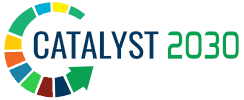Catalyst 2030 Team in Focus
This month’s team spotlight falls again on the Chapters team.
Meet Paula Andrea Pena, John Paul (John) Uminga, Danielle Tsamo, Splendour Wanjjiru, Thu Dinh and Brian Maina of the team that helps build local collaborative networks through the establishment of regional and country Catalyst 2030 Chapters.
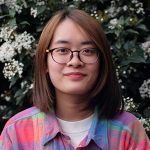
Asia Pacific Intern
Thu Dinh
About Thu
Thu is part of the Catalyst 2030 Chapter Team supporting the APAC region, and currently doing her PhD in Milan, Italy.
She is a curious and avid researcher in anthropology with passion for culture, food and travel. As a someone who has moved around for education, she channels her apprehension about multicultural learning experience into research. Besides interests in mobility and education research, she is also trying to learn more about the social sector and to find a way in which she can advance both the general body of knowledge and society.
Thu is motivated a sense of urgency that calls for collective actions around the world. Feeling the limited applicable scope of the academic world, she finds her own way to engage directly with meaningful social actions with Catalyst 2030.
Q and A
What do you enjoy most about Catalyst 2030?
I enjoy witnessing the inspiring dedication and passion within this amazing group of global individuals. It takes a bit of courage to make change, but a lot more resilience to follow through with it. So I appreciate the shared energy that powers everyone through everyday when they are trying to do good things for the world.
Why is systems change work close to your heart?
My journey with education has broadened my horizon, while at the same time instilling so many doubts about the way of the world, all the while making me reflect on the predicaments in the story of my own people. I would like to believe that we will learn to be better and that there is a way towards equality, empathy and sustainable growth. System change, once achieved, will be the ultimate learning experience that changes lives for generations to come.
What is your dream job?
While there are many things factoring in a ‘dream job’, I would like to centre on the human factor. People are important. Interactions, conversations between people make things happen. My dream job should be one that puts me among generous, passionate people whose greed is only for things that make themselves and the world a better place.
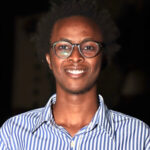
Africa Regional Coordinator
Brian Maina
About Brian
Brian is the founder of Eco Rafiki Africa, an eco-friendly social enterprise combating plastic pollution by introducing bio-degradable and compostable tableware as an alternative to plastics. He has a background in interior architecture/design, is an avid adventurer, an environmentalist, an aesthete, a Climate Reality Leadership Corps Fellow, an Oxford school of Climate Change Hilary 2022 Fellow, Kenyan African youth leader, advocate and activist for better policies in Africa and moving Africa towards a sustainable future.
Q and A
What do you enjoy most about Catalyst 2030?
Working at Catalyst 2030 allows me to align my professional goals with my personal values. Catalyst 2030 offers me the opportunity to contribute to solving pressing global challenges and improving the lives of people and the planet.
Why is systems change work close to your heart?
I thrive in creative problem-solving, experimentation and learning from failure. Over the years I have navigated complex systems by thinking innovatively, adapting and nurturing the willingness to challenge the status quo.
What is your dream job?
Every job I take on is a dream job. I am truly motivated by work that allows me to make a positive difference in people’s lives. I am always excited about the potential of working with like-minded individuals and leveraging my skills to make tangible impact.
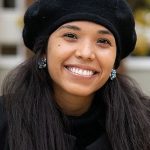
Latin America Chapter Coordinator
Paula Andrea Pena
About Paula
Paula is an Afro-descendant woman from Colombia and a woman leader who has supported social causes in her native region on the Island of San Andres in Colombia, helping the Raizal population. She studied Law on a scholarship and read for a Masters degree in Conflict, Security and Development at the University of Sussex in England, thanks to a British Government Chevening Scholarship in 2021.
Paula has also studied in the United States, Canada, France and England and has had the opportunity to live in China where she did an internship at the Colombian Embassy in China. She speaks English and French.
Her professional career has included stints in different public, private and international organisations and government entities in Colombia, including the Vice-Presidency of Colombia and internships in NGOs and international organisations.
Q and A
What do you enjoy most about Catalyst 2030?
What I enjoy most about Catalyst 2030 is that it is a family of fantastic team members who love what they do, who give back every day and allow me to meet wonderful people. This work enables me to learn from people who are passionate about social change and use my knowledge to help support the world. Happiness comes from solving problems, and when we contribute with our work to help people around the world to solve society problems makes us happy. Catalyst 2030 makes me very happy
Why is systems change work close to your heart?
To create real change it is necessary to transform structures, power dynamics and relationships and promote a bottom-up approach. It is necessary to mobilise the community and promote collaborations and collaborative power in order to achieve the objectives of communities and empower citizens. For this reason, I believe that a systems change approach is the best way to promote structural changes in society and achieve real impacts.
What is your dream job?
My dream job was a job where I can grow intellectually and spiritually and be happy. It is a job where I can connect with people who are passionate about what they do and promote systemic change. Since I have had the opportunity to meet Catalyst 2030 in 2020 I fell in love with this initiative and dreamed of working in a place to promote collaborative leadership, foster a spirit of generosity, co-create mindsets and come up with new solutions and strategies to the challenges that global citizens face, in order to advance the 2030 Agenda.
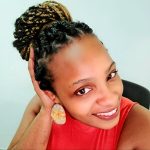
Africa Regional Coordinator
Danielle Tsamo
About Danielle
Danielle describes herself as an African Woman whose goal is to show her sisters their shackles, quoting Anita Hill who said, “I did what my conscience told me to do, and you can’t fail if you do that.”
Another of Danielle’s favorite quotes is from Margaret Sanger, “No woman can call herself free who does not control her own body,. Danielle used to think that she must be free as she had the ability to work, bear children (if she wanted) and go to school, until she realised that these “freedoms” were only allowed to her as far as whe fit within her traditional role as a woman. For example, was she truly free to have an abortion?. The laws say otherwise. Was she free to marry who she wanted or not? Her traditions suggested otherwise. Was she free to work and get promoted? Her culture/societal patriarchy might only allow her to get as far as a glass ceiling.
Danielle believes that these realisations are shared by most women who look like her and who come from a similar background. She and others, she says, understand that only economic status can lead to the desired freedoms.
Q and A
What do you enjoy most about C2030?
I love our focus on members, how we go from the local to the global as we embrace all social entrepreneurs, governments, businesses alike through one common goal. We collaborate to achieve higher dreams such as the SDGs.
Why is System Change work close to your heart?
To better answer this question, I have to first share the vision I have of system change. It’s all about deconstructing what is, to rebuild what works. Both movements are only feasible through interactions. For example, if we want to change financial systems as they are today, we have to redesign capitalism and the people entrenched within the capitalist system. This work is close to my heart because rebuilding to make systems more functional for, better adapted to, and more just for people who live within the system, thereby enabling them to live better lives, is a dream.
What is your dream job?
My dream job is to work alongside social entrepreneurs who focus on making life better for women and society at large.
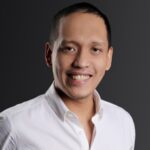
Asia Pacific Coordinator
John Paul (John) Uminga (he/his/him)
About John
John is a social enterprise and social innovation advocate, educator, and practitioner, with 15 years of experience in the entrepreneurship promotion and development, inclusive business, SMEs and sustainability spaces. He has previously done impact work with the Philippine Center for Entrepreneurship, Office of the Presidential Consultant on Entrepreneurship (Philippines), University of Sydney Incubate and Charles Sturt University.
He is currently a PhD scholar researching the nexus of social networks and social enterprise at the Queensland University of Technology, interested in exploring how social entrepreneurs mobilise resources to achieve outcomes.
He is an alumnus of ChangemakerXChange Asia and Australasia (2021) and the Young Southeast Asian Leaders Initiative (YSEALI) Professional Fellowship Program (Fall 2015).
John has Liberal Arts degree from the Far Eastern University Manila, graduating Magna Cum Laude and he also holds a Masters degree in Strategy, Innovation and Entrepreneurship from the University of Sydney (as an Australia Awards scholar).
John is into journaling, volleyball and badminton, restaurant-hopping and long bus rides.
Q and A
What do you enjoy most about Catalyst 2030?
The entire Catalyst 2030 work, so to speak! Creating spaces for people to connect and collaborate is such important work. But while this sounds all serious, it is the opportunity to get to know social innovators working on different advocacies and to connect with them on the personal level that is something that I cherish.
Why is systems change work close to your heart?
We’re all connected, and there’s more that we can do if we pull down barriers and work collaboratively. I’ve seen this firsthand working in the meaningful youth engagement and entrepreneurship development spaces. To be honest, we don’t really have a choice if we want to address the wicked challenges of our time.
What is your dream job?
My dream job is to have my own social impact consulting practice that supports impact-driven organisations in or for the Global South, while helping educate the next generation of leaders.

Africa Chapters Intern
Splendour Wanjjiru
About Splendour
Splendour is a Kenyan, majorly passionate about women’s rights and gender equity and justice, currently figuring out how to navigate her career path.
Working with Catalyst 2030 has given her opportunities to learn more about creating social impact which continuously helps her to map out her future as a changemaker.
Outside of Catalyst 2030, she loves adventure and outdoor activities, and having a good time while creating memories with her loved ones.
Q and A
What do I enjoy most about Catalyst 2030?
Working with Catalyst 2030 is always a learning experience which I constantly enjoy. Catalyst 2030 and the team have exposed me to so much in the social world and in spaces I never thought I would be in. The major focus on the SDGs is a sector I actively studied and Catalyst 2030 has given me a platform to know and learn how to approach them from a systemic perspective in order to tackle them. I also love the team culture and working with a diverse team who I get to learn from, even on a personal level.
Why is systems change work close to your heart?
Before working with Catalyst 2030, I didn’t know much about systems change, but afterwards, I realised how systems change is important in making a significant social impact and how it may help me solve issues I am passionate about, such as gender equality and justice. Systems change has become so close to me that I am currently undertaking a short course on systems change to get to learn more about this profound way of tackling social issues.
What is your dream job?
I don’t think I particularly have a dream job. What I do have, is the hope to become a changemaker in the future where I will effect significant, positive social impact and make the world, starting with communities around me, a better place for women like me to live in.
